Role of the United Nations in protecting and promoting civic space
OHCHR and protecting and expanding civic space
“People wish to be heard and to participate in the decisions that affect them. Institutions could establish better ways of listening to people whom they are meant to serve and taking their views into account, especially groups that are frequently overlooked, such as women, young people, minority groups or persons with disabilities.”
António Guterres, Secretary-General of the United Nations
Our Common Agenda
Partnerships with civil society have long been instrumental for UN and its entities, at the global, regional and national levels, to implement their mandates. The UN has also sought to promote and protect civic space in a multitude of ways, e.g. through rule of law programming, capacity development, advocacy in support of open space, including through the work of UN human rights bodies and mechanisms. However, it is during the last years that the UN has increasingly focused on participatory approaches to decision-making and policy discussions, recognizing that they help forge a positive dynamic between people and their governments. Meaningful participation throughout the policy cycle allows administrations to address grievances, which in turn makes societies safer and more resilient and policymaking more effective and legitimate. The UN therefore committed to stepping up efforts towards joint strategies to promote and protect civic space.
Our Common Agenda
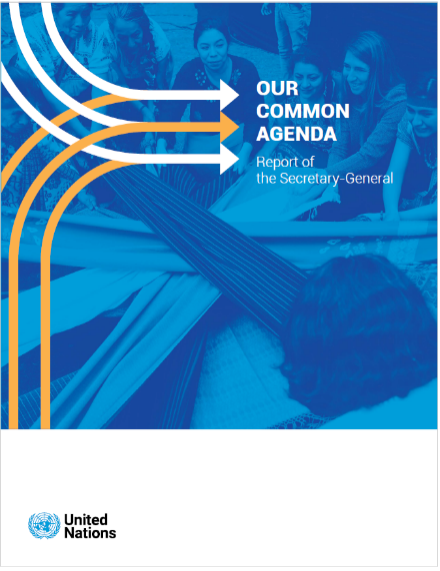 The 2021 Secretary-General’s report on “Our Common Agenda” sets out the United Nations’ vision for reinvigorated, inclusive, networked and effective multilateralism to address contemporary challenges in the areas of development, peace and security, climate change, and human rights. The Common Agenda calls for a new equitable and inclusive social contract, built on trust between institutions and the peoples, and to do so, calls for full implementation of the Secretary-General’s Call to Action for Human Rights and the UN Guidance Note on Protecting and Promoting Civic Space.
The 2021 Secretary-General’s report on “Our Common Agenda” sets out the United Nations’ vision for reinvigorated, inclusive, networked and effective multilateralism to address contemporary challenges in the areas of development, peace and security, climate change, and human rights. The Common Agenda calls for a new equitable and inclusive social contract, built on trust between institutions and the peoples, and to do so, calls for full implementation of the Secretary-General’s Call to Action for Human Rights and the UN Guidance Note on Protecting and Promoting Civic Space.
The United Nations system thus committed to:
- Supporting States in renewing the social contract particularly focusing on trust, addressing discrimination and exclusion, and measuring what matters;
- Building on recent innovations in listening to, consulting and engaging with people around the world, and put people at the centre of all its actions and take into account the impact of intersecting personal characteristics such as age, gender and diversity;
- Promoting inclusive participation of various stakeholders, in particular women and youth;
- Addressing frontier issues and prevent harms in the digital or technology spaces, including in relation to freedom of speech, hate speech and harassment, and privacy;
- Establishing dedicated focal points for civil society in each entity to create proactively the space necessary for civil society actors to contribute to the work of the Unite Nations at the country and global levels; and
- Developing new agendas for peace and for protection.
United Nations Guidance Note on Protection and Promotion of Civic Space
In September 2020, under the leadership of the Secretary-General, the United Nations launched a system-wide Guidance Note on Protecting and Promoting Civic Space. The Guidance Note recognizes civic space as a threshold issue for successful implementation of all three pillars of the United Nations and commits the United Nations system to take concrete steps in protecting and promoting civic space at the global and country levels.
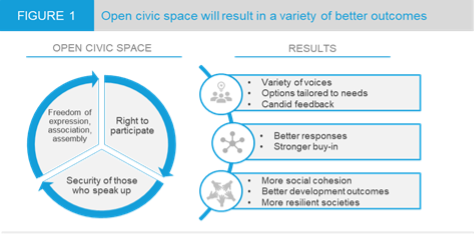
The Guidance Note defines civic space as the environment that enables people and groups to participate meaningfully, online and offline, in the political, economic, social and cultural life of their societies, within which people express their views freely and without fear, assemble peacefully, associate and engage in decision-making processes in relation to issues that affect their lives. The Guidance Note focuses on "3 Ps" as yardsticks for the UN’s civic space efforts:
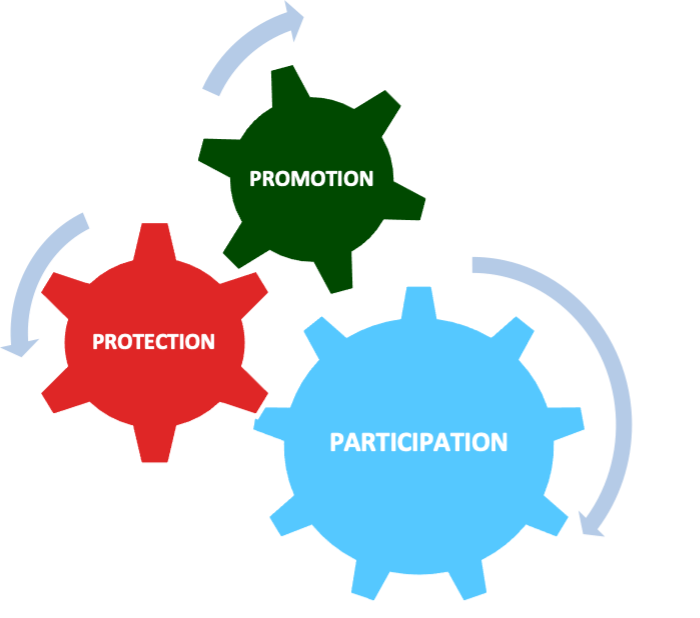
- Participation: Ensure inclusive, safe and meaningful civil society participation in UN intergovernmental processes;
- Protection: Contribute to protection of civil society actors at risk (including from intimidation and reprisals for cooperating with the UN);
- Promotion: Actively promote inclusive, safe and meaningful civil society participation in decision-making and open civic space at the country level, including legal and policy frameworks that facilitate debate online and offline and allow civil society to organize freely.
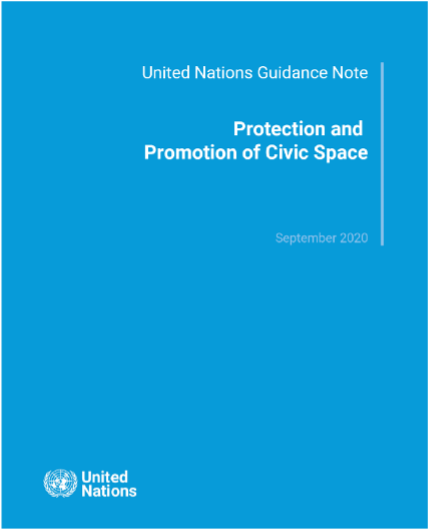
Download the full UN Guidance Note
English | Français | Español
Download the Executive Summary
العربية | 中文 | English | Français | Русский | Español
As part of public outreach, OHCHR and UN-Women co-organized a virtual panel discussion, The UN and Civic Space: Strengthening Participation, Protection and Promotion, on 4 December 2020, featuring civil society and UN representatives.
Watch the recording of the event here on YouTube.
Civic space and the UN Secretary General's Call to Action for Human Rights
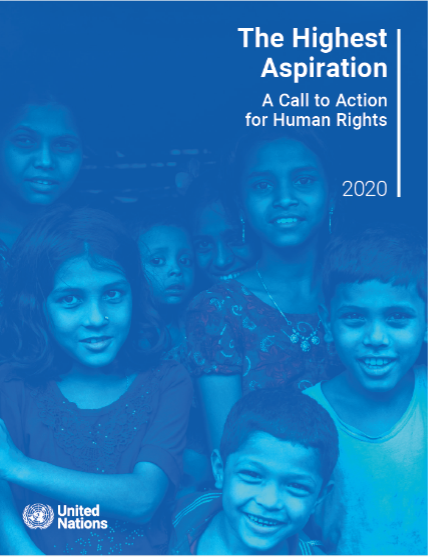 In February 2020, the Secretary-General launched "The Highest Aspiration: A Call to Action for Human Rights", on the occasion of the 75th anniversary of the United Nations, which emphasized that society is stronger and more resilient when women and men can play a meaningful role in political, economic and social life, contributing to policy-making that affects their lives, including by accessing information, engaging in dialogue, expressing dissent and joining together to express their views. But in too many places, open space for this participation is under threat, from repressive laws and, increased restrictions on the work of journalists and human rights defenders, especially women.
In February 2020, the Secretary-General launched "The Highest Aspiration: A Call to Action for Human Rights", on the occasion of the 75th anniversary of the United Nations, which emphasized that society is stronger and more resilient when women and men can play a meaningful role in political, economic and social life, contributing to policy-making that affects their lives, including by accessing information, engaging in dialogue, expressing dissent and joining together to express their views. But in too many places, open space for this participation is under threat, from repressive laws and, increased restrictions on the work of journalists and human rights defenders, especially women.
The Call to Action for human rights thus identifies “public participation and civic space” as a priority area and commits to a number of action points, including to:
- Increasing UN support and strengthen UN tools to empower civil society, protect civic space and encourage participation by all groups in democratic processes and promote laws and policies to that effect;
- Ensuring that Resident Coordinators, UN Country Teams and heads of United Nations peace operations, in partnership with civil society organizations, contribute to an enabling environment for civic space; and
- Supporting more systematic participation of civil society in United Nations bodies and agencies, with special attention to women’s rights organizations and young people.
Civic space also permeates all other areas in the Call, as it refers to engagement with, and support to, Member States on creating avenues for civil society participation; increased support at field level for the development of protection mechanisms for human rights defenders; more regular participation of and consultations with diverse women’s human rights organizations and creating space for young people to participate in shaping the decisions that will affect their future; and applying the human rights framework to the digital space.